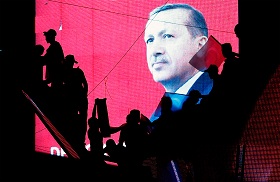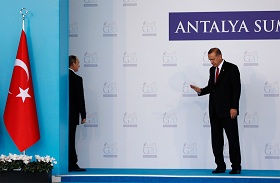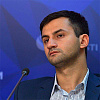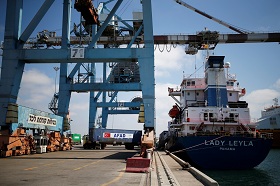Turkey’s Pivot: Back on the Path to “Zero Problems with its Neighbours”?
(no votes) |
(0 votes) |
Ph.D. in History, Scientific Advisor of The Evgeny Primakov Center for International Cooperation, Senior Research Fellow, Center for the Arab and Islamic Studies, Institute of Oriental Studies RAS
Turkey’s foreign policy in recent years has limited its room for manoeuvre in the international arena. The course of former Prime Minister Ahmet Davutoglu – "zero problems with our neighbours” – has been replaced by what some observers describe as “zero neighbours with no problems.” The current policy aimed at normalizing relations with Russia, Israel and other countries reflects the change of the balance of forces in the Turkish leadership and is intended to demonstrate its pragmatism. The strategic nature of the new course, however, is open to doubt, though it is likely to continue in the short term.
Turkey’s foreign policy in recent years has limited its room for manoeuvre in the international arena. The course of former Prime Minister Ahmet Davutoglu – "zero problems with our neighbours” – that had underpinned the policy of the ruling Justice and Development Party since the end of the 2000s, has been replaced by what some observers (1,2,) describe as “zero neighbours with no problems.” The current policy aimed at normalizing relations with Russia, Israel and other countries reflects the change of the balance of forces in the Turkish leadership and is intended to demonstrate its pragmatism. The strategic nature of the new course, however, is open to doubt, though it is likely to continue in the short term.
From “Zero Problems with Neighbours” to “Zero Neighbours with no Problems”
Stability in the neighbouring regions was a pre-condition for the development of the Republic of Turkey, which has since the early 2000s been forging mutually beneficial relations with other players, aimed mainly at close economic interaction. The only interest Turkey ever showed in the internal affairs of other states was when they affected the interests of Turkish business. The rest of the time, the Recep Erdogan government maintained a neutral stance. However, turbulence in and around the Middle East forced the Turkish Government to respond to the mounting threats.
Turbulence in and around the Middle East forced the Turkish Government to respond to the mounting threats.
On the one hand, some decisions were prompted by the fact that Erdogan had to clarify his position regarding the transformations that took place in 2011–2012 in previously authoritarian Arab countries. Turkey’s policy was meant to be a response to the Arab street, which demanded democratization and transparent governance. On the other hand, the deteriorating socioeconomic situation in these countries, especially on Turkey’s borders with Iraq and Syria, spelled new opportunities as well as risks.
The risks proved to be higher and the result of the new course was the growing isolation of Turkey. Analysts in Europe (and elsewhere) spoke of a policy of “Neo-Ottomanism,” a movement dictated by the imperial thinking of the descendants of the Ottomans. More specifically, “Neo-Ottomanism” referred to Turkey’s new foreign policy strategy, which made pragmatic use of, and unifying the Kemalist, Islamist and Pan-Turkic character of the state. The media and academics attributed the authorship of this course to the former Foreign Minister and Prime Minister Ahmet Davutoglu, though we do not find the term “Neo-Ottomanism” in his “strategic depth” concepts. The concept had been used in academia before, but it began to be used more frequently in the works of European, as well as some Balkan, scholars and was then picked up by the media and other analysts. It was Erdogan, not Davutoglu, who played the leading role in strengthening this strand of foreign policy. However, references to historical events of the Ottoman Empire were made by both leaders (1, 2), especially Erdogan, to boost his status within the country and the region.

Ruslan Mamedov:
Turkey After the Attempted Military Coup.
Keeping the Foreign Policy Course
In Egypt and Tunisia, Turkey supported the former opposition Islamist projects of the Muslim Brotherhood, which brought Mohamed Morsi to power in Egypt and Rached Ghannouchi’s Al-Nahda to power in Tunisia through democratic elections. Later, the Tunisian Al-Nahda party yielded power to the secular Nidaa Tounes (Call of Tunisia) party, but remained a legal entity. It was at this time that the Egyptian army managed to topple President Mohamed Morsi and outlaw the Muslim Brotherhood. The failing of the Muslim Brotherhood was that, while it was successful in developing anti-government propaganda, it had no experience dealing with state affairs, especially socioeconomic ones. Turkey declared the 2013 events in Egypt a military coup that overthrew a democratically elected president, and relations deteriorated.]
At the start of the Syrian crisis, Turkey assumed an anti-Assad position, apparently expecting the situation in that country to develop according to the Tunisian or Egyptian scenarios. However, that did not happen. And since relations with the Bashar Assad administration had soured, Turkey started supporting opposition groups, which, as society was radicalized and the conflict dragged on, became less secular and, to use Western analytical terminology, was becoming openly Salafist and Jihadist. The war, which destroyed state institutions in Iraq and Syria, brought about a humanitarian disaster and spawned various radical Islamist organizations, confronting Turkey with several major challenges. The lucrative pre-crisis trade and economic relations with Syria and Iraq were replaced by the influx of 2.7 million refugees, multi-billion dollar losses, terrorist attacks and the deterioration of the internal political situation. However, at that point in time, the main threat to the Turkish administration came not from the Islamic State, but from Kurdish separatists, fuelled by the Syrian crisis.
At the start of the Syrian crisis, Turkey apparently expecting the situation in that country to develop according to the Tunisian or Egyptian scenarios.
The Kurds had the backing of the global community, especially since they were fighting the Islamic State. People’s Protection Units (YPG) fought alongside soldiers from the Kurdistan Workers’ Party – considered to be a terrorist group in Turkey – to defeat the Islamic State in the border town of Kobani or Ayn al-Arab. At a critical moment, Turkey yielded to U.S .pressure andallowed Peshmerga, the military forces of Iraqi Kurdistan, to use its territory to render limited assistance to the Kurds in Kobani. With air support of the U.S.-led coalition, the Kurds managed to push the Islamic State far to the south. The Syrian Democratic Forces (SDF), which were formed in 2016 and consist of Kurdish and small Arab units, continue fighting several dozen kilometres from the Islamic State’s Syrian capital of Rakka with the aim, at this stage, of taking full control of Manbij.
The possible formation of a Kurdish belt in northern Syria and Iraq is Ankara’s main headache because these territories may be used by the Kurdistan Workers’ Party and other extremist forces to destabilize the situation in Turkey’s less developed, Kurdish-occupied southeast. Because of this, Turkey seeks to prevent the establishment of close contacts between Russia and the Kurds, and it is one more reason for normalizing relations with Russia. The Turkish government forged mutually beneficial relations with the Iraqi Kurds. Since 2014, Erbil has been pumping oil from Iraqi Kurdistan to Turkey (and on to Israel) via a pipeline, while the market in the Kurdish part of Iraq is saturated with Turkish goods, and Turkish business has a big presence in the region. All this, along with the temporary presence of Turkish advisers in Iraq, could not but worry the central government in Baghdad, which was left out of these deals.

Ilshat Saetov:
Recep Erdogan’s Letter Is an
Acknowledgement that the Attack on SU-24
Failed to Achieve its Goals
The rift between Russia and Turkey occurred over the Syrian issue. The confrontation with Russia and Syria, support for the (mostly Sunni) Syrian opposition and the controversial policy in Iraq prompted Erdogan to use pro-Sunni policy and rhetoric. Naturally, this approach brought Turkey into the Sunni camp in the region, where the shots are called by Saudi Arabia and Qatar, and distanced it from Shiite Iran, another extremely important partner.
Normalization of Relations and the Interests of All the Sides
All this time the debate continued within the Turkish establishment about the further development of the country in view of its internal political situation. In May 2016, Ahmet Davutoglu was succeeded as Prime Minister by Binali Yildirim. The move need not mislead anyone. The adjustment of the foreign policy course took place not because Davutoglu left (he actually favoured normalization and a resumption of talks with the Kurdistan Workers’ Party), but because of the changed balance of forces within the Turkish establishment and the pressure exerted on decision-making by the architect of the previous foreign policy course, Recep Erdogan, who retained his position after Ahmet Davutoglu quit. Normalizing relations with its neighbours became a pragmatic necessity for the Republic of Turkey.
The possible formation of a Kurdish belt in northern Syria and Iraq is Ankara’s main headache.
The day before Turkey apologized to Russia, Turkey and Israel signed an agreement on restoring relations in Rome. Relations had been broken off six years earlier, in May 2010, when the Erdogan Government sent a Mavi Marmara humanitarian vessel – the so-called Freedom Flotilla – to the Palestinian side of the Gaza Strip, with the aim of breaking the blockade there. The vessel was seized by Israel, and ten Turkish citizens were killed in the process. In 2013, Israel made a formal apology under pressure from U.S. President Barack Obama, but that did not meet all the Turkish demands, one of which was the lifting of the blockade of Gaza Strip. That goal was never achieved, so the current Turkey–Israel agreement keeps a total blockade of the Gaza Strip in place. Nevertheless, Israel allowed Turkey to take part in humanitarian projects in the Gaza Strip, notably in power and water supply, provided it did not jeopardize Israel’s security. Humanitarian cargoes were initially to be sent to the Israeli port of Ashdod before being transferred to Gaza. The first 11,000 tonnes of cargo have already arrived at the port and after an inspection were delivered to Gaza.
The rift between Russia and Turkey occurred over the Syrian issue.
Turkey is attempting to prevent terrorist activities from being carried out against Israel, including fundraising at home, and to act as a mediator in the return of missing Israel Defense Forces fighters and civilians who had been detained by Hamas, the leading political force in Gaza. According to Israeli sources, Turkey will also help Israel join the international organizations of which it is a member. Above all, this means NATO, Israel’s accession to which had been invariably blocked by Turkey.
Prime Minister of Israel Benjamin Netanyahu also said that a normalization of relations would bring substantial economic benefits to Israel. Likely referencing major projects, trade between Turkey and Israel, in spite of the crisis, more than doubled over five years to $5.6 billion as of the beginning of 2015. The sale of Israeli natural gas is strategically important for Turkey and Israel as Israeli gas flows supply Turkey’s needs before going to Europe. The project to build a new market and infrastructure may be joined by Egypt and Cyprus, where massive natural gas deposits have also been discovered. That move, however, needs further work in order to resolve existing contradictions. Gas from the Levantine Basin may become important when it comes to diversifying supplies to Europe, and in the longer term may compete with Russian gas. Frequent personal meetings between Netanyahu and Putin produced a common position on the issue. Russia could be given a part in this project: Russian companies may be brought in to develop it (over possible resistance from the United States). Russia may also offer stability and gas transport infrastructure security in the Eastern Mediterranean. Thus, the warming of Israel–Russia–Turkey relations is aimed at securing and stabilizing the region, calling for closer interaction among the security services of the three countries.
While work to restore relations between Turkey and Israel had been going on for a long time without economic relations being interrupted, Turkey had to proceed differently and from a different basis in its relations with Russia. In spite of continuing economic growth in Turkey, Russian sanctions dealt a blow to certain sectors of the Turkish economy, causing jobs and money to be lost. Besides this, the security situation in the country was deteriorating and terrorist attacks had become more frequent.
Analysts today compare Turkey with pre-crisis Syria, which also flirted with radical Islamists, secure in the knowledge that its special services were monitoring the situation. While Syria was used by radical Islamists to make their way to Iraq to destabilize the situation there and undermine the U.S. mission, Turkey was the conduit of material and human resources heading for Syria (the paths to Iraq continued to function too). Such networks tend to be autonomous and, as the Syria case has shown, they can be used for transit to a neighbouring country and for anti-government actions inside the country.
Russia may also offer stability and gas transport infrastructure security in the Eastern Mediterranean.
To ensure its security, Turkey will probably fight these networks within the country – not abruptly, but rather gradually. The fight has already started (since March 2015, hundreds of members of extremist groups have been put behind bars) and it will be accompanied by terrorist attacks. It will take time for the Turkish special services to destroy these networks, choke off their supply channels and arrest all the (often influential) individuals linked with this business. It would be very hard for Turkey to meet that challenge without coordination with such actors as Russia and Israel. Ankara’s diplomatic activity is prompted by the need to cooperate with states that could become partners in fighting radical groups.
In addition to Russia and Israel, Ankara is mending fences with Iraq, and also looking towards Egypt. In connection with the recent explosions in Baghdad, Prime Minister Haider al-Abadi was told by his Turkish counterpart Binali Yildirim that Turkish hospitals were ready to take the wounded from Karrada in eastern Baghdad. The Iraqi Prime Minister noted that Iraq and Turkey had the same enemy, terrorism, “which kills innocent citizens during this holy month.” The Iraqi media then reported that Recep Erdogan had sent condolences to the President of Iraq Fuad Masum, stressing that Turkey supports Iraq in its war against the Islamic State.
Restoring contacts with Egypt would be a slow process and require extensive diplomatic efforts. Turkey has not recognized the legitimacy of the Abdel Fattah al-Sisi administration, which is the key condition set by the Egyptian side for the further development of relations. Perhaps Israel can be instrumental in bringing about a rapprochement, considering that it recently received, for the first time in nine years, an Egyptian Minister of Foreign Affairs – Sameh Shoukry. The Turkish government dispatched a delegation to seek ways of bridging the gaps between positions.
Ankara’s diplomatic activity is prompted by the need to cooperate with states that could become partners in fighting radical groups.
Turkey is worried by the regional policy of Iran, which has a military presence in Syria and Iraq, and very serious influence on political decision-making in the Middle East. The lifting of the sanctions against Iran will strengthen the country and open up a range of possibilities for it. This is what the states in the region fear, especially in the absence of a regional security institution. However, Iran was one of the first states to immediately declare its position regarding the abortive military coup in Turkey, declaring its support for President Erdogan. The foreign ministers, presidents and parliament speakers of the two countries were in permanent contact during and after the coup. Barack Obama spoke in support of democracy in Turkey when it became clear that the coup had failed, while the King of Saudi Arabia only broke the silence two days later.
Normalization of relations between Turkey and Russia means that certain agreements on the Syrian crisis exist. At this stage, Russia’s support for the Assad government remains unchanged. This suggests that Turkey may change its stance. The Prime Minister of Turkey Binali Yildirim has already announced that Turkey intends to foster “good relations” with Syria. The following day, though, he said that constructive interaction with Damascus is impossible unless Bashar Assad goes. Even so, the signal has come through. The reasons for a change of stance may vary: U.S. support for the Syrian Kurds; awareness of the need to forge relations with Bashar Assad, who has held on to power; the sprouting of a wide spectrum of extremist organizations on the borders and within the country; and isolation from regional projects.
The question is: How will Ankara’s allies react? Qatar and Saudi Arabia, for instance, are not fond of this course. The recent terrorist attacks in Saudi Arabia may force King Salman to revise his position. But in that case the monarchies may lose their partners in Syria. It was Turkey’s participation in the “pro-Sunni” coalition that enabled Saudi Arabia to support anti-government groups in Syria. If the supply routes via Turkey are cut, it would be a heavy blow to pro-Saudi groups in the negotiating process. Jordan is extremely inconvenient for that purpose. Moreover, the Hashemite Kingdom is well aware of the danger of continuing instability. Not so long ago, the Islamic State carried out a terrorist attack on a border post by blowing up a Jordanian army vehicle they had stuffed with explosives, killing seven Jordanian border guards.
***
Although Turkey’s relations with the United States have taken a turn for the worse because of the problems that have piled up, Ankara and Washington continue to cooperate in various spheres, including the defence industry. The high degree of interdependence and the need to preserve cooperation channels will force the two countries to look for balance in their relations.
Wide-scale purges in Turkey and suggestions that the death penalty may be reintroduced make the prospect of the Republic of Turkey joining the European Union more remote. While relations with the United States and Europe have cooled, the process of normalizing relations with Russia will continue, partly because of Russia’s position on the attempted coup. The reaction of the European Union to Erdogan’s domestic policy moves is likely to strengthen Turkey’s short-term course for cooperation with Russia and Iran, since the Iranian leadership was one of the first to support President Erdogan.
Teheran and Moscow expect Turkey to soften its stand on Syria. However, at this juncture, the Turkish government is more concerned with internal problems. The Turkish army and intelligence services are undergoing massive purges. This rules out the possibility of Turkish troops being sent to Syria. Turkey has also withdrawn its troops from Iraq. If talks about coordinated actions on Syria were conducted between Moscow and Ankara before the coup, under the new conditions, it will take several months to establish cooperation between the relevant structures. The developments in the region and Ankara’s policy will in many ways be determined by the internal political situation in Turkey, which is still far from stable.
(no votes) |
(0 votes) |





